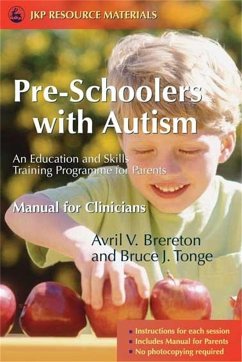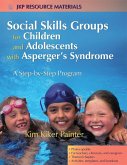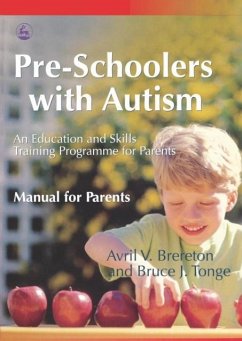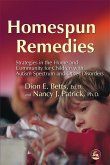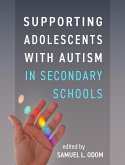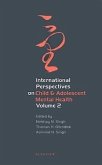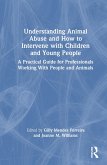Avril Brereton, Bruce Tonge
Pre-Schoolers with Autism
An Education and Skills Training Programme for Parents - Manual for Clinicians
Avril Brereton, Bruce Tonge
Pre-Schoolers with Autism
An Education and Skills Training Programme for Parents - Manual for Clinicians
- Broschiertes Buch
- Merkliste
- Auf die Merkliste
- Bewerten Bewerten
- Teilen
- Produkt teilen
- Produkterinnerung
- Produkterinnerung
This ground-breaking training programme has been developed in response to a real need for evidence-based early interventions for very young autistic children. Authoritative and extensively tried and tested, it will help both parents and carers to understand the disorder and how it affects child development. Ultimately, the program is designed to reduce the severity of emotional/behavioural difficulties by managing a child's particular problems and encouraging effective collaboration between professionals and parents. Structured as a series of individual and small group sessions, the programme…mehr
Andere Kunden interessierten sich auch für
![Social Skills Groups for Children and Adolescents with Asperger's Syndrome Social Skills Groups for Children and Adolescents with Asperger's Syndrome]() Kim Kiker PainterSocial Skills Groups for Children and Adolescents with Asperger's Syndrome85,99 €
Kim Kiker PainterSocial Skills Groups for Children and Adolescents with Asperger's Syndrome85,99 €![No Child Left Unwrapped No Child Left Unwrapped]() Shelley L FrancisNo Child Left Unwrapped22,99 €
Shelley L FrancisNo Child Left Unwrapped22,99 €![Pre-Schoolers with Autism Pre-Schoolers with Autism]() Avril V. BreretonPre-Schoolers with Autism31,99 €
Avril V. BreretonPre-Schoolers with Autism31,99 €![Homespun Remedies Homespun Remedies]() Dion BettsHomespun Remedies31,99 €
Dion BettsHomespun Remedies31,99 €![Supporting Adolescents with Autism in Secondary Schools Supporting Adolescents with Autism in Secondary Schools]() Supporting Adolescents with Autism in Secondary Schools61,99 €
Supporting Adolescents with Autism in Secondary Schools61,99 €![International Perspectives on Child and Adolescent Mental Health International Perspectives on Child and Adolescent Mental Health]() Nirbhay N Singh / Thomas H Ollendick / Ashvind N Singh (eds.)International Perspectives on Child and Adolescent Mental Health201,99 €
Nirbhay N Singh / Thomas H Ollendick / Ashvind N Singh (eds.)International Perspectives on Child and Adolescent Mental Health201,99 €![Understanding Animal Abuse and How to Intervene with Children and Young People Understanding Animal Abuse and How to Intervene with Children and Young People]() Understanding Animal Abuse and How to Intervene with Children and Young People183,99 €
Understanding Animal Abuse and How to Intervene with Children and Young People183,99 €-
-
-
This ground-breaking training programme has been developed in response to a real need for evidence-based early interventions for very young autistic children. Authoritative and extensively tried and tested, it will help both parents and carers to understand the disorder and how it affects child development. Ultimately, the program is designed to reduce the severity of emotional/behavioural difficulties by managing a child's particular problems and encouraging effective collaboration between professionals and parents. Structured as a series of individual and small group sessions, the programme is designed to run for 20 weeks and covers key areas such as understanding and managing difficult behaviour; changing/encouraging new behaviours; communication problems in verbal and non-verbal children; social problems; and how to work and play together.
Hinweis: Dieser Artikel kann nur an eine deutsche Lieferadresse ausgeliefert werden.
Hinweis: Dieser Artikel kann nur an eine deutsche Lieferadresse ausgeliefert werden.
Produktdetails
- Produktdetails
- Verlag: Jessica Kingsley Publishers
- Seitenzahl: 144
- Erscheinungstermin: 15. Januar 2005
- Englisch
- Abmessung: 232mm x 362mm x 10mm
- Gewicht: 227g
- ISBN-13: 9781843103417
- ISBN-10: 1843103419
- Artikelnr.: 21491219
- Herstellerkennzeichnung
- Libri GmbH
- Europaallee 1
- 36244 Bad Hersfeld
- gpsr@libri.de
- Verlag: Jessica Kingsley Publishers
- Seitenzahl: 144
- Erscheinungstermin: 15. Januar 2005
- Englisch
- Abmessung: 232mm x 362mm x 10mm
- Gewicht: 227g
- ISBN-13: 9781843103417
- ISBN-10: 1843103419
- Artikelnr.: 21491219
- Herstellerkennzeichnung
- Libri GmbH
- Europaallee 1
- 36244 Bad Hersfeld
- gpsr@libri.de
Avril V. Brereton is a Senior Research Fellow in the Monash University Centre for Developmental Psychiatry and Psychology in Melbourne, Australia. She has worked for many years with autistic children and their families in a variety of research, teaching and clinical settings and provides consultation to community health, education and welfare agencies. She also presents educational workshops for parents and professionals. Bruce J. Tonge is Professor and Head of the Monash University School of Psychology and Psychiatry and Psychological Medicine and established the successful Centre for Developmental Psychology and Psychiatry at the University. He has a distinguished record of teaching and research in child psychiatry, many years experience in clinical practice and a particular interest in Pervasive Developmental Disorders, mental health problems and intellectual disability, and effective treatments of emotional and behavioural disorders in childhood. Avril and Bruce are married and live in Melbourne with their children, Labradors, a cat and `Murray' the magpie. In their spare time, Avril enjoys playing the piano and pipe organ and Bruce enjoys music, reading and gardening.
Acknowledgements. Preface. Introduction. SECTION ONE: HOW TO RUN THIS
PROGRAMME. Group Session 1. Outline and goals of the programme. Individual
Session 1. An educational session with a focus on your child's development
and behavioural symptoms. Group Session 2. Issues for parents after the
diagnosis. Individual Session 2. Issues for parents after the diagnosis.
Group Session 3. Understanding and managing difficult behaviour. Individual
Session 3. Understanding and managing difficult behaviour. Group Session 4.
How to change inappropriate behaviour by manipulating consequences.
Individual Session 4. How to change inappropriate behaviour by manipulating
consequences. Group Session 5. How to encourage new behaviour. Individual
Session 5. How to encourage new behaviour. Group Session 6. Communication
problems in autism in verbal children. Individual Session 6. Communication
problems in autism in verbal children. Group Session 7. Communication
problems in autism in non-verbal children. Individual Session 7.
Communication problems in autism in non-verbal children. Group Session 8.
Social impairment in autism. Individual Session 8. Social impairment in
autism. Group Session 9. How to work and play together. Individual Session
9. How to work and play together. Group Session 10. Review and critique of
programme - where next? Individual session 10. Review and critique of
programme - where next? SECTION TWO: GROUP AND INDIVIDUAL SESSION NOTES
1-10. Group Session 1. Outline and goals of the programme. Individual
Session 1. An educational session with a focus on your child's development
and behavioural symptoms. Group Session 2. Issues for parents after the
diagnosis. Individual Session 2. Issues for parents after the diagnosis.
Group Session 3. Understanding and managing difficult behaviour. Individual
Session 3. Understanding and managing difficult behaviour. Group Session 4.
How to change inappropriate behaviour by manipulating consequences.
Individual Session 4. How to change inappropriate behaviour by manipulating
consequences. Group Session 5. How to encourage new behaviour. Individual
Session 5. How to encourage new behaviour. Group Session 6. Communication
problems in autism in verbal children. Individual Session 6. Communication
problems in autism in verbal children. Group Session 7. Communication
problems in autism in non-verbal children. Individual Session 7.
Communication problems in autism in non-verbal children. Group Session 8.
Social impairment in autism. Individual Session 8. Social impairment in
autism. Group Session 9. How to work and play together. Individual Session
9. How to work and play together. Group Session 10. Review and critique of
programme - where next? Individual session 10. Review and critique of
programme - where next? Appendix 1. Useful websites and further reading.
Appendix 2. Autism and Asperger's Disorder. References. Sample - Course
completion certificate for parents.
PROGRAMME. Group Session 1. Outline and goals of the programme. Individual
Session 1. An educational session with a focus on your child's development
and behavioural symptoms. Group Session 2. Issues for parents after the
diagnosis. Individual Session 2. Issues for parents after the diagnosis.
Group Session 3. Understanding and managing difficult behaviour. Individual
Session 3. Understanding and managing difficult behaviour. Group Session 4.
How to change inappropriate behaviour by manipulating consequences.
Individual Session 4. How to change inappropriate behaviour by manipulating
consequences. Group Session 5. How to encourage new behaviour. Individual
Session 5. How to encourage new behaviour. Group Session 6. Communication
problems in autism in verbal children. Individual Session 6. Communication
problems in autism in verbal children. Group Session 7. Communication
problems in autism in non-verbal children. Individual Session 7.
Communication problems in autism in non-verbal children. Group Session 8.
Social impairment in autism. Individual Session 8. Social impairment in
autism. Group Session 9. How to work and play together. Individual Session
9. How to work and play together. Group Session 10. Review and critique of
programme - where next? Individual session 10. Review and critique of
programme - where next? SECTION TWO: GROUP AND INDIVIDUAL SESSION NOTES
1-10. Group Session 1. Outline and goals of the programme. Individual
Session 1. An educational session with a focus on your child's development
and behavioural symptoms. Group Session 2. Issues for parents after the
diagnosis. Individual Session 2. Issues for parents after the diagnosis.
Group Session 3. Understanding and managing difficult behaviour. Individual
Session 3. Understanding and managing difficult behaviour. Group Session 4.
How to change inappropriate behaviour by manipulating consequences.
Individual Session 4. How to change inappropriate behaviour by manipulating
consequences. Group Session 5. How to encourage new behaviour. Individual
Session 5. How to encourage new behaviour. Group Session 6. Communication
problems in autism in verbal children. Individual Session 6. Communication
problems in autism in verbal children. Group Session 7. Communication
problems in autism in non-verbal children. Individual Session 7.
Communication problems in autism in non-verbal children. Group Session 8.
Social impairment in autism. Individual Session 8. Social impairment in
autism. Group Session 9. How to work and play together. Individual Session
9. How to work and play together. Group Session 10. Review and critique of
programme - where next? Individual session 10. Review and critique of
programme - where next? Appendix 1. Useful websites and further reading.
Appendix 2. Autism and Asperger's Disorder. References. Sample - Course
completion certificate for parents.
Acknowledgements. Preface. Introduction. SECTION ONE: HOW TO RUN THIS
PROGRAMME. Group Session 1. Outline and goals of the programme. Individual
Session 1. An educational session with a focus on your child's development
and behavioural symptoms. Group Session 2. Issues for parents after the
diagnosis. Individual Session 2. Issues for parents after the diagnosis.
Group Session 3. Understanding and managing difficult behaviour. Individual
Session 3. Understanding and managing difficult behaviour. Group Session 4.
How to change inappropriate behaviour by manipulating consequences.
Individual Session 4. How to change inappropriate behaviour by manipulating
consequences. Group Session 5. How to encourage new behaviour. Individual
Session 5. How to encourage new behaviour. Group Session 6. Communication
problems in autism in verbal children. Individual Session 6. Communication
problems in autism in verbal children. Group Session 7. Communication
problems in autism in non-verbal children. Individual Session 7.
Communication problems in autism in non-verbal children. Group Session 8.
Social impairment in autism. Individual Session 8. Social impairment in
autism. Group Session 9. How to work and play together. Individual Session
9. How to work and play together. Group Session 10. Review and critique of
programme - where next? Individual session 10. Review and critique of
programme - where next? SECTION TWO: GROUP AND INDIVIDUAL SESSION NOTES
1-10. Group Session 1. Outline and goals of the programme. Individual
Session 1. An educational session with a focus on your child's development
and behavioural symptoms. Group Session 2. Issues for parents after the
diagnosis. Individual Session 2. Issues for parents after the diagnosis.
Group Session 3. Understanding and managing difficult behaviour. Individual
Session 3. Understanding and managing difficult behaviour. Group Session 4.
How to change inappropriate behaviour by manipulating consequences.
Individual Session 4. How to change inappropriate behaviour by manipulating
consequences. Group Session 5. How to encourage new behaviour. Individual
Session 5. How to encourage new behaviour. Group Session 6. Communication
problems in autism in verbal children. Individual Session 6. Communication
problems in autism in verbal children. Group Session 7. Communication
problems in autism in non-verbal children. Individual Session 7.
Communication problems in autism in non-verbal children. Group Session 8.
Social impairment in autism. Individual Session 8. Social impairment in
autism. Group Session 9. How to work and play together. Individual Session
9. How to work and play together. Group Session 10. Review and critique of
programme - where next? Individual session 10. Review and critique of
programme - where next? Appendix 1. Useful websites and further reading.
Appendix 2. Autism and Asperger's Disorder. References. Sample - Course
completion certificate for parents.
PROGRAMME. Group Session 1. Outline and goals of the programme. Individual
Session 1. An educational session with a focus on your child's development
and behavioural symptoms. Group Session 2. Issues for parents after the
diagnosis. Individual Session 2. Issues for parents after the diagnosis.
Group Session 3. Understanding and managing difficult behaviour. Individual
Session 3. Understanding and managing difficult behaviour. Group Session 4.
How to change inappropriate behaviour by manipulating consequences.
Individual Session 4. How to change inappropriate behaviour by manipulating
consequences. Group Session 5. How to encourage new behaviour. Individual
Session 5. How to encourage new behaviour. Group Session 6. Communication
problems in autism in verbal children. Individual Session 6. Communication
problems in autism in verbal children. Group Session 7. Communication
problems in autism in non-verbal children. Individual Session 7.
Communication problems in autism in non-verbal children. Group Session 8.
Social impairment in autism. Individual Session 8. Social impairment in
autism. Group Session 9. How to work and play together. Individual Session
9. How to work and play together. Group Session 10. Review and critique of
programme - where next? Individual session 10. Review and critique of
programme - where next? SECTION TWO: GROUP AND INDIVIDUAL SESSION NOTES
1-10. Group Session 1. Outline and goals of the programme. Individual
Session 1. An educational session with a focus on your child's development
and behavioural symptoms. Group Session 2. Issues for parents after the
diagnosis. Individual Session 2. Issues for parents after the diagnosis.
Group Session 3. Understanding and managing difficult behaviour. Individual
Session 3. Understanding and managing difficult behaviour. Group Session 4.
How to change inappropriate behaviour by manipulating consequences.
Individual Session 4. How to change inappropriate behaviour by manipulating
consequences. Group Session 5. How to encourage new behaviour. Individual
Session 5. How to encourage new behaviour. Group Session 6. Communication
problems in autism in verbal children. Individual Session 6. Communication
problems in autism in verbal children. Group Session 7. Communication
problems in autism in non-verbal children. Individual Session 7.
Communication problems in autism in non-verbal children. Group Session 8.
Social impairment in autism. Individual Session 8. Social impairment in
autism. Group Session 9. How to work and play together. Individual Session
9. How to work and play together. Group Session 10. Review and critique of
programme - where next? Individual session 10. Review and critique of
programme - where next? Appendix 1. Useful websites and further reading.
Appendix 2. Autism and Asperger's Disorder. References. Sample - Course
completion certificate for parents.

